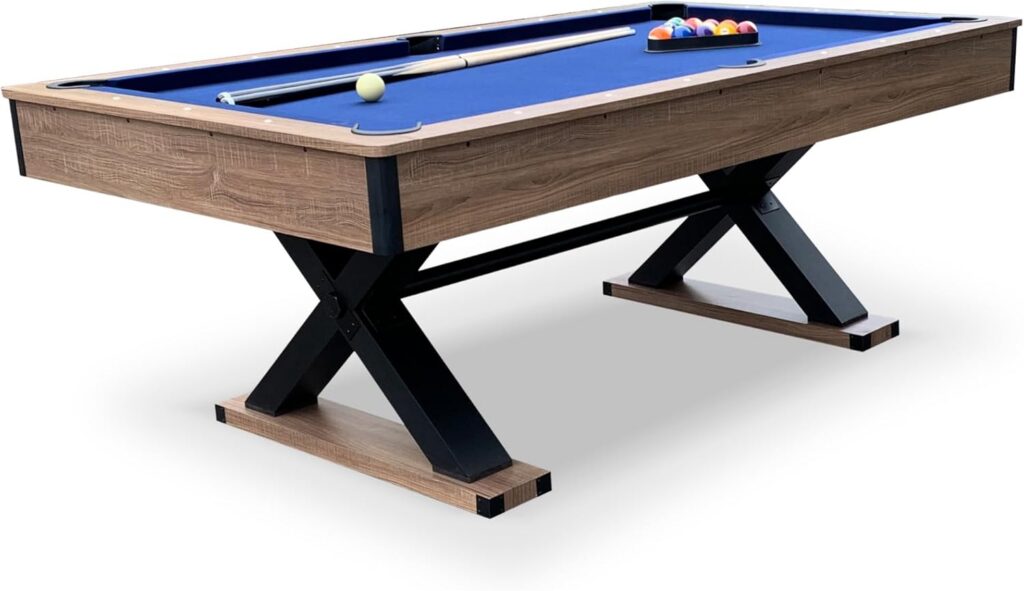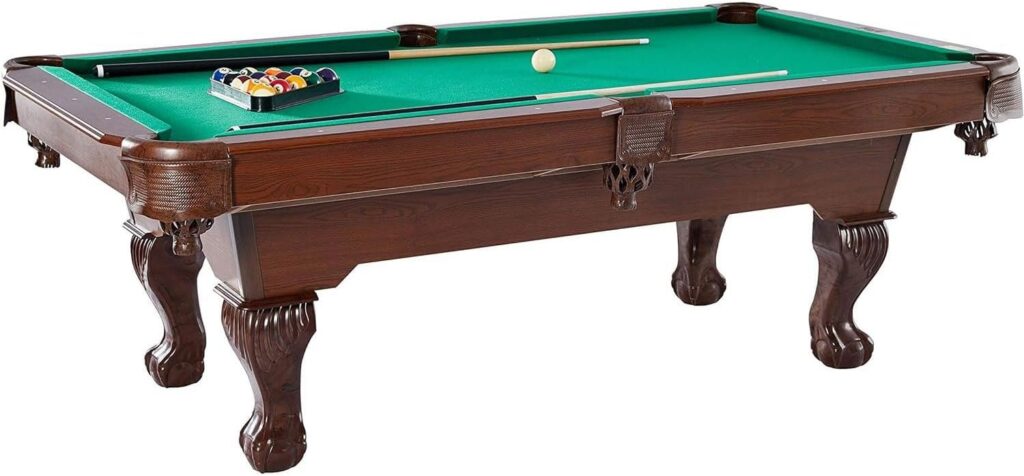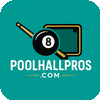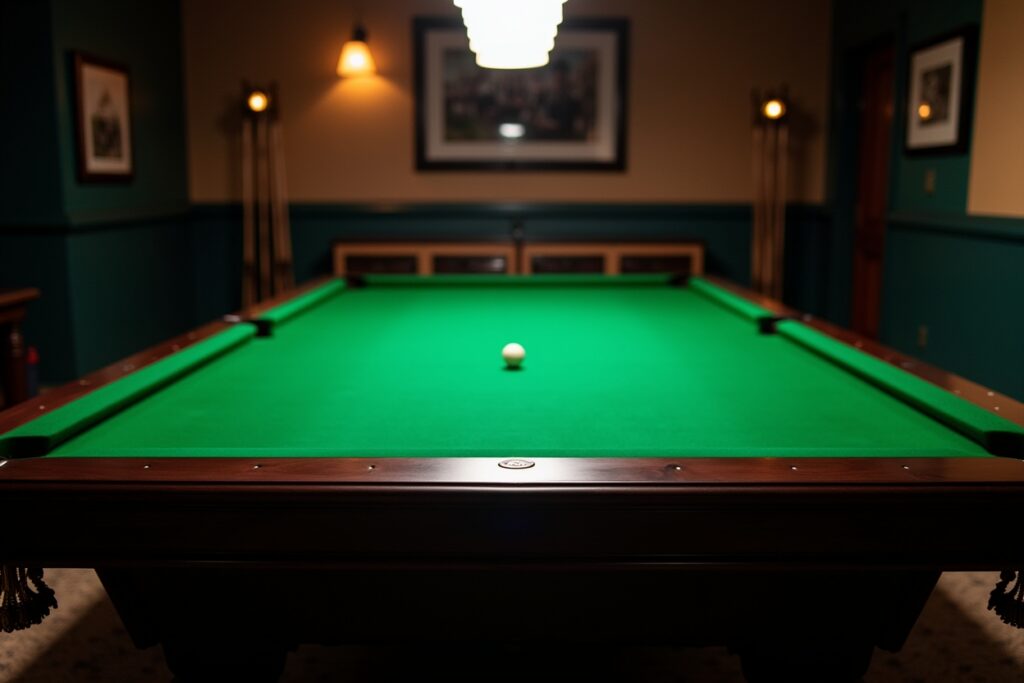This post contains affiliate links. We may earn a commission if you purchase through our links, at no extra cost to you.
My neighbor bought a non-slate table at Walmart for $400. Looked great in the photos.
Six months later, the playing surface warped. Balls rolled to one corner. He asked if I could “just level it better.”
Can’t level a warped surface. That’s the fundamental problem with most non-slate tables.
I’ve played on both types for 15 years. Owned two slate tables and tested three non-slate options. Here’s the truth about what you’re actually paying for.
What Is Slate (And Why It Matters)
Slate is metamorphic rock. Dense, heavy, perfectly flat when machined properly.
Three-piece slate is standard on quality tables. Each piece weighs 150-250 pounds. Installers level each piece individually, then seal the seams.
Result? Playing surface that stays dead-flat for decades. Temperature changes don’t affect it. Humidity doesn’t warp it. Time doesn’t bend it.
That’s worth something. Question is: how much?
Slate Pool Tables: The Professional Standard
Construction Details
Typical Slate Specs:
- 3-piece construction (on 7-8ft tables)
- 1-piece on some smaller tables
- Thickness: 3/4″ to 1″ (thicker = better)
- Weight: 450-800 pounds total
- Backed by wooden frame
The slate sits on the table frame. Felt stretches over the slate. That’s basically it.
Simple design that’s worked for 200+ years.
Performance Characteristics
I’ve tested ball roll on both types dozens of times. Slate wins every test.
Ball Roll: Place ball at one end. Shoot straight across table. On quality slate, ball travels ruler-straight.
On non-slate, ball usually curves slightly. Sometimes noticeably.
Consistency: Slate plays identical in summer humidity and winter dryness. Non-slate shifts with seasons.
Cushion Response: Slate’s rigidity supports cushions properly. Balls rebound predictably. Bank shots work as expected.
Non-slate flex affects cushion response. Makes precise shots harder.
Slate Table Pricing
Budget Slate Tables ($1,200-$2,000):
- 3/4″ three-piece slate
- Basic cloth
- Simpler frame design
Fat Cat Frisco 7.5′ Pool Table – Entry-level slate that plays well.
Mid-Range Slate ($2,000-$4,000):
- 1″ three-piece slate
- Better wool cloth
- Solid hardwood frame
- Improved cushions
Regal Slate Billiard Pool Table – Good quality for the price.
Premium Slate ($4,000-$10,000+):
- Tournament-grade slate
- Championship cloth
- Professional cushions
- Lifetime frame warranty
Brunswick tables – Industry gold standard.
Slate Advantages
Plays Like Pro Tables: Same surface pros use. Your practice translates to tournament play.
Lasts Decades: Slate doesn’t degrade. 50-year-old slate tables still play perfect.
Better Resale Value: Quality slate tables hold value. My $2,500 table is still worth $1,200 five years later.
Climate Stable: Humidity, temperature changes—slate doesn’t care.
True Level: Professional installers can level slate to 1/100th inch. That precision lasts years.
Slate Disadvantages
Weight: 800+ pounds total. Requires professional moving. Can’t move it yourself safely.
Installation Cost: Professional setup runs $300-500. Not optional—you’ll crack slate doing it yourself.
Initial Price: Entry point around $1,200 new. That’s real money.
Floor Requirements: Needs solid, level foundation. Weak floors can’t support the weight.
Permanent Investment: Once it’s in your basement, it’s staying there. Moving costs make relocation expensive.
Non-Slate Pool Tables: Budget Alternative
Material Options
MDF (Medium Density Fiberboard): Most common non-slate surface. Compressed wood fibers and resin.
Particleboard: Cheaper than MDF. More prone to warping.
Plywood: Better than particleboard. Still inferior to slate.
Honeycomb Aluminum: Rare. Lightweight. Better than wood alternatives but still not slate quality.
Performance Reality
I’ll be direct: non-slate tables don’t play like slate tables.
Best Case Scenario: High-quality MDF with proper support plays acceptably for casual games. You’ll notice the difference, but it’s playable.
Typical Scenario: Budget tables warp within 1-2 years. Balls roll crooked. Frustrating gameplay.
Worst Case: Cheap tables arrive warped. Virtually unplayable from day one.
Non-Slate Pricing
Budget Non-Slate ($200-$600):
- MDF or particleboard
- Cheap cloth
- Plastic pockets
- Minimal warranty

Hathaway Excalibur 7ft – Decent for kids/casual use.
Better Non-Slate ($600-$1,200):
- Quality MDF with support
- Better cloth
- Improved construction
- Some warranty

Barrington Springdale 7.5ft – Best non-slate option I’ve tested.
Non-Slate Advantages
Affordable Entry: Get playing for $300-600. Low barrier to entry.
Easy Setup: Most assemble with basic tools. No professional installer needed.
Lightweight: Can move with friends and a truck. 200-300 pounds total.
Room Flexibility: Lighter weight means more floor options. Upper floors, mobile homes, weak foundations.
Good for Kids: Kids learning pool don’t need slate precision. Save money here.
Non-Slate Disadvantages
Warping: MDF absorbs humidity. Expands and contracts. Eventually warps.
I’ve seen tables warp in as little as 6 months (humid basements). Some last 3-4 years (climate-controlled rooms).
Inconsistent Play: Ball roll varies across surface. Makes practicing advanced techniques difficult.
Lower Resale Value: $500 table might sell for $100 used. If you can sell it at all.
Cushion Issues: Flexible playing surface affects cushion performance. Bank shots feel off.
Shorter Lifespan: 5-10 years maximum. Usually less. Slate tables last generations.
Head-to-Head Comparison
Flatness and Level
Slate: Factory machined to within 0.001 inches. Installers level to 1/100 inch. Stays level for decades.
Non-Slate: Manufactured tolerance maybe 1/16 inch. Warps over time. Eventually unplayable.
Winner: Slate (not even close)
Ball Roll Quality
Slate: Balls roll perfectly straight. Consistent speed across entire surface.
Non-Slate: Subtle curves. Variable speed. Advanced players notice immediately.
Winner: Slate
Durability
Slate: Lasts 50+ years. Outlives everything else on the table (cloth, cushions, frame).
Non-Slate: 5-10 years typical. Climate-dependent. Some fail much sooner.
Winner: Slate
Weight and Portability
Slate: 800+ pounds. Professional movers only. Basically permanent.
Non-Slate: 200-350 pounds. Move with friends. Relatively portable.
Winner: Non-slate
Setup Difficulty
Slate: Professional installation required. $300-500 cost. 2-4 hours.
Non-Slate: DIY with basic tools. Free (your labor). 2-6 hours depending on skill.
Winner: Non-slate
Initial Cost
Slate: Minimum $1,200 new. Usually $2,000+ for quality.
Non-Slate: $300-800 for decent options.
Winner: Non-slate
Long-Term Value
Slate: $2,500 table worth $1,200 after 5 years. Still playable after 20+ years.
Non-Slate: $500 table worth $50-100 after 3 years. Probably unplayable after 8-10 years.
Winner: Slate
Skill Development
Slate: Practice translates directly to pool halls and tournaments. Learn proper techniques.
Non-Slate: Inconsistent surface teaches compensation for warping. Doesn’t translate well.
Winner: Slate
Who Should Buy Slate
Serious players: If you’re joining leagues or playing tournaments, slate is non-negotiable. You need consistent practice surface.
Permanent home installation: Basement pool room that’s staying put? Slate makes sense. The weight doesn’t matter if you’re never moving it.
Long-term investment mindset: Planning to play for 10+ years? Slate’s higher upfront cost amortizes over decades.
Proper room conditions: Climate-controlled space with solid flooring? Slate will perform perfectly here.
Resale value matters: Quality slate tables hold value. Budget non-slate becomes worthless.
Who Should Buy Non-Slate
Kids learning pool: Children don’t need professional-grade playing surfaces. They’ll outgrow or lose interest before warping matters.
Casual players: Beer and buddies on Friday nights? Non-slate plays fine for casual 8-ball.
Frequent movers: Military, renters, or anyone moving every few years—portability matters more than perfection.
Budget constraints: $400 available, $2,000 needed. Non-slate gets you playing now.
Weak floors: Upper floors, mobile homes, older construction—slate’s weight might not be feasible.
Temporary situation: Game room that might become nursery in 3 years? Don’t invest in slate.
The Hybrid Option: Used Slate
Best value in pool tables exists in quality used slate market.
I bought my current 8ft Brunswick for $1,500. Comparable new table costs $4,500.
Moving cost $400. Worth it for $3,000 table that plays like new.
Finding used slate tables takes patience but delivers incredible value.
Real Cost Analysis
Budget Non-Slate: 5-Year Ownership
Initial:
- Table: $500
- Assembly (your time): $0
- Accessories: $75
Total: $575
5-Year Costs:
- Minimal maintenance
- Possibly recovered felt once: $150
Total Invested: $725
Resale value after 5 years: $50-100 (if sellable)
Net Cost: $625-675
Budget Slate: 10-Year Ownership
Initial:
- Table: $1,500 (quality used)
- Professional moving/setup: $400
- Accessories: $75
Total: $1,975
10-Year Costs:
- Felt recovery (2x): $600
- Cushion replacement: $500
- Maintenance: $200
Total Invested: $3,275
Resale value after 10 years: $900-1,100
Net Cost: $2,175-2,375
Per year: $217-237
The Math
Non-slate costs less upfront. But replace it twice in 10 years.
Two $500 non-slate tables over 10 years = $1,000 + setup time.
One quality slate table = $1,975 upfront but lasts 30+ years with maintenance.
Common Misconceptions
“Non-slate plays fine if you level it properly”
Wrong. Levelness isn’t the issue. Flatness is. You can’t level a warped surface.
“Slate is overkill for home use”
Depends on your goals. Casual players? Maybe. Serious practice? Not overkill at all.
“All slate tables play the same”
Nope. Slate thickness, cushion quality, felt grade—all matter. $1,200 slate ≠ $4,000 slate.
“Non-slate tables last as long with proper care”
No amount of care prevents MDF from responding to humidity. Material properties matter.
My Recommendation by Situation
Budget under $800, kids/casual use: Quality non-slate like Barrington Springdale. Acceptable compromise.
Budget $1,000-2,000, serious player: Used quality slate from Facebook Marketplace. Best value available.
Budget $2,000-4,000, permanent installation: New mid-range slate. Get exact configuration you want.
Budget $4,000+, serious player: Premium slate from Brunswick, Diamond, or similar. Buy once, play lifetime.
What I Actually Own
Two slate tables. Sold my non-slate within a year.
Home table: Brunswick 8ft. Bought used for $1,500. Plays perfectly six years later.
Practice table: 7ft Valley used bar table. $600. Commercial-grade slate handles abuse.
Both will outlive me. Can’t say that about non-slate.
Final Decision Framework
Choose Non-Slate if:
- Budget under $800
- Kids or very casual use
- Might move frequently
- Weak floor structure
- Trying pool before committing
Choose Slate if:
- Serious about improving
- Permanent installation
- Budget allows $1,200+
- League or tournament player
- Want lifetime table
Choose Quality Used Slate if:
- Best value mindset
- Patient shopper
- Can handle moving costs
- Want pro-quality at budget price
Frequently Asked Questions
Can I replace non-slate with slate?
Technically yes, but frame usually can’t support the weight. Essentially building new table.
Will slate crack?
Only with severe impact or improper moving. Properly installed and maintained, slate lasts indefinitely.
Can you convert slate to non-slate?
Why would you? That’s downgrading significantly.
How do I know if a used table is really slate?
Look underneath. Slate is dark gray/black rock. MDF is tan/brown compressed wood. Tap it—slate sounds like rock, MDF sounds hollow.
Where to Shop
New Slate Tables:
- Amazon – Good selection, delivery included
- Wayfair – Competitive pricing
- Local billiards stores – Test before buying
Used Slate Tables:
- Facebook Marketplace
- Craigslist
- Estate sales
Budget Non-Slate:
- Amazon
- Walmart
- Big-box sporting goods stores
Related Articles
- Pool table buying guide: New vs Used
- Pool table accessories essentials
- Room size and setup requirements (coming soon)
—
Prices accurate as of January 2025. As an Amazon Associate, we earn from qualifying purchases.

